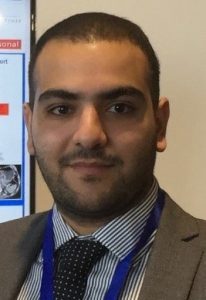Dr Tony Sorial
 Overview
Overview
Cohort: 4
PhD start date: 5 August 2020
I am an academic orthopaedic surgeon with a focus on arthritis and ageing research.
I undertook undergraduate training (MBChB – Medicine and Surgery, MSc – Tissue Engineering for Regenerative Medicine) at The University of Manchester, with my research project focussing on optimising culture conditions to enhance the differentiation of Mesenchymal Stem Cells (MSCs) into cartilage.
As a postgraduate I completed the NIHR Academic Foundation Programme (North West) and in 2016 was appointed as an NIHR Academic Clinical Fellow in Trauma and Orthopaedics in the Northern Deanery.
Since 2016, I have focused on understanding the genetics and epigenetics of disabling musculoskeletal diseases (mainly osteoarthritis). I aim to apply this knowledge, and CRISPR-based genome editing tools, to develop novel therapies from MSCs and Human induced Pluripotent Stem Cells (HiPSCs).
In future, this work aims to develop pathways for the production and validation of genetically resilient cartilage from human cell sources to treat osteoarthritis.
My PhD fellowship is based at multiple research institutions, with 16 months spent in Newcastle, 18 in St Louis, Missouri and 4 weeks in Vienna/Manchester.
Key collaborators
- Professors John Loughlin & David Deehan – Newcastle University, UK (genetics, epigenetics & surgical translation)
- Professor Judith Hoyland – The University of Manchester, UK (matrix biology)
- Professor Farsh Guilak – Washington University in St Louis, Missouri, USA (cartilage regeneration from MSCs and HiPSCs, mechanobiology, single cell RNA sequencing)
- Professor Gerhard Wiche – Universität Wien, Vienna, Austria (cytoskeletal biology, plectinopathies)
Specialty interests
- Molecular genetics and epigenetics
- DNA Methylation analyses
- CRISPR-Cas9/dCas9 genome and epigenome editing
- MSC and HiPSC chondrogenesis
- Mechanobiology
- Tissue engineering and regeneration
- RNA sequencing including single cell (scRNA-Seq)
- Visualising the cellular cytoskeleton
- Patient and public involvement / engagement (PPI/E)
Career aspirations
After completing my PhD, I aim to continue my research, either via the NIHR integrated academic training programme or external post-doctoral funding.
I hope to use this time to develop research independence and simultaneously complete my surgical training.
My long-term goal is to be appointed as an academic orthopaedic surgeon with a laboratory group developing translational solutions to disabling musculoskeletal disease.
I would hope that, in future, our work can improve the quality of life for patients suffering with these conditions.


0 Comments